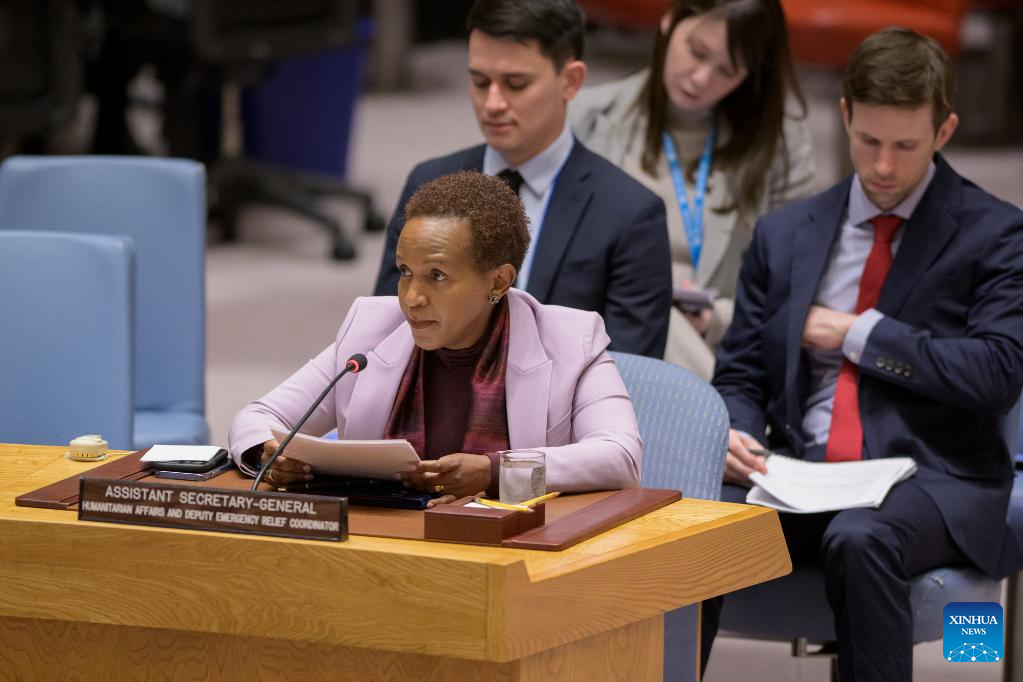
UN Assistant Secretary-General for Humanitarian Affairs Joyce Msuya (Front) speaks at a Security Council meeting on Yemen at the UN headquarters in New York, on March 15, 2023. Msuya stressed the need to strengthen Yemen's economy on Wednesday. (Manuel Elias/UN Photo/Handout via Xinhua)
UNITED NATIONS, March 15 (Xinhua) -- UN Assistant Secretary-General for Humanitarian Affairs Joyce Msuya stressed the need to strengthen Yemen's economy on Wednesday.
Economic decline is among the top drivers of humanitarian needs, and aid agencies want to do much more to help Yemenis move beyond the immediate crisis, Msuya, also deputy emergency relief coordinator in the Office for the Coordination of Humanitarian Affairs, told the UN Security Council in a briefing.
"One priority is to clean up the awful landmines and other explosives that are killing and maiming so many, as well as choking off economic life," she said. "We are eager to start. But we need more resources and more specialized partners."
Getting started also requires ensuring agencies face fewer obstacles and are able to deliver principled assistance, she added.
Beyond mine action, the United Nations is working with donors and partners on a revised economic framework that will help address broader economic drivers of humanitarian needs in Yemen, said Msuya.
"This year offers an important opportunity to make progress on these economic drivers while we still have the benefit of a massive aid operation in the country," she said, warning that "if we miss this opportunity, it will become much harder to ever transition toward a smaller aid operation without putting millions of lives at risk."
These efforts will depend on everyone's support, which means investment by donors, as well as policy measures to promote economic growth, said Msuya, adding that the loss of government revenue following Houthi attacks on oil export infrastructure last October remains a serious challenge, particularly for efforts to pay salaries and fund basic services.
Msuya also expressed concern over "the perennial challenge of access and security."
Agencies are now increasingly present in places that in the past were extremely hard to reach due to fighting, constraints by the authorities, and internal UN security rules. Houthi authorities have also recently accelerated approvals of aid projects in the areas they control. But the overall picture on access and security remains very dark. In Houthi-controlled areas, Yemeni female aid workers are still unable to travel without male guardians, she noted.
This is causing serious disruptions in the ability of agencies to assist women and girls safely and reliably. The humanitarian community calls on the Houthi authorities to lift all such movement restrictions and to work with the United Nations to identify an acceptable way forward on this issue, she said.
Insecurity persists in many areas, threatening aid workers and preventing access in some places, she added.
The last year has brought a number of improvements to Yemen. The truce was a major step forward. Another improvement has been a decline in the number of people going hungry in Yemen, by almost 2 million people, with the worst levels of hunger having dropped to zero, largely thanks to the efforts of humanitarian workers, the support of donors, and to the truce itself, she said.
"But we must not rejoice too much because Yemen remains a staggering emergency," as more than 17 million people are counting on aid agencies for assistance and protection this year, and agencies do not have what they need to help, said Msuya.
"Access and security are still major challenges. Funding is in short supply. And economic problems are pushing even more people into destitution," she noted. ■



